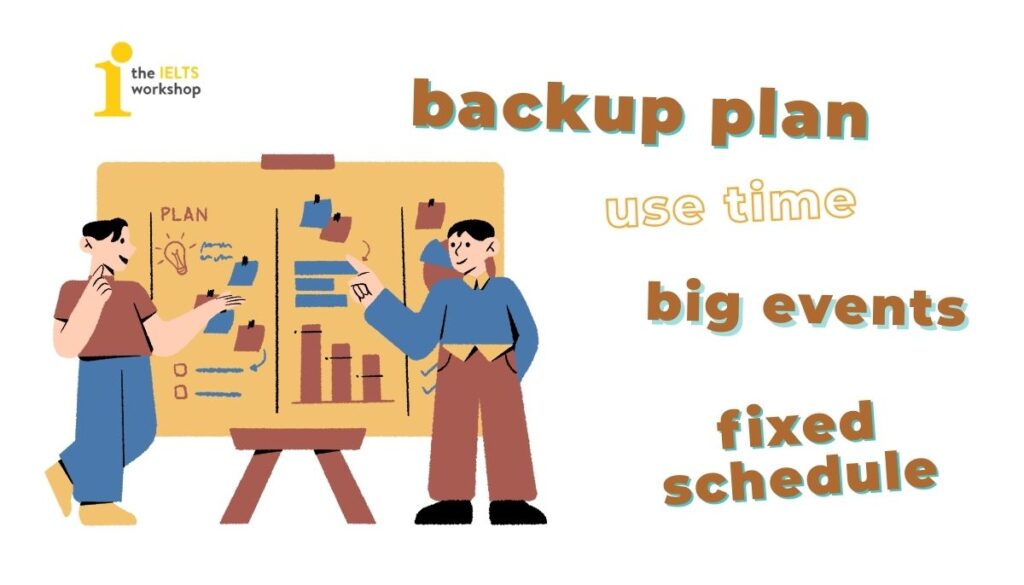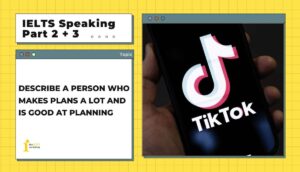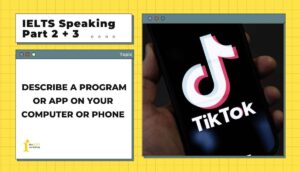Chủ đề Describe a time when you and some other people made a plan to do an activity là một dạng câu hỏi quen thuộc trong IELTS Speaking Part 2. Đề bài này yêu cầu bạn thuật lại trải nghiệm cùng người khác xây dựng và thực hiện một kế hoạch. Trong bài mẫu dưới đây, thầy Đào Đình Tân sẽ gợi ý cách phát triển nội dung rõ ràng, súc tích và hiệu quả, từ đó giúp bạn dễ ghi điểm hơn trong phần thi Speaking.
Part 2: Describe a time when you and some other people made a plan to do an activity
You should say
- What it was
- When and where you made it
- What the activity was
- And explain how you felt about the plan
1. Bài mẫu (Sample)
Well, a plan that immediately came to mind is when my classmates and I decided to organize a small picnic last year. We made this plan right after the final exam period, when everyone was exhausted and desperately needed a break. The idea actually came up quite spontaneously during a casual chat in the school library. At first, it was just a joke about skipping classes and heading to the countryside, but then we all realized it was actually a brilliant idea.
We agreed to have the picnic at a riverside park about 30 minutes away from our city. It was the perfect spot because it was peaceful, scenic, and big enough for outdoor activities. Each of us was assigned a responsibility: some brought food, others prepared drinks, and a few took care of games and entertainment. The activity itself was nothing extravagant—just eating together, playing frisbee, and sharing stories—but it turned out to be one of the most memorable days we’d had as a group.
Personally, I felt a mix of excitement and relief. Excitement because I knew it would be a chance to strengthen our friendship, and relief because it was a well-deserved escape from stress. Looking back, what I value most about that plan is not the picnic itself but the sense of teamwork and unity it created. It showed me that sometimes the simplest plans, when done with the right people, can bring the greatest joy.
Sample by Dao Dinh Tan, IELTS Teacher at The IELTS Workshop
2. Từ vựng (Vocabulary)
- come to mind (verb phrase): nảy ra trong đầu
- exhausted (adj.): kiệt sức, cực kỳ mệt
- desperately (adv.): cực kỳ, một cách khẩn thiết
- spontaneously (adv.): một cách tự phát, không chuẩn bị trước
- casual chat (noun phrase): cuộc trò chuyện thoải mái, không trang trọng
- brilliant idea (noun phrase): ý tưởng tuyệt vời
- scenic (adj.): có cảnh đẹp
- be assigned a responsibility (verb phrase): được giao một trách nhiệm
- extravagant (adj.): xa xỉ, quá mức cần thiết
- memorable (adj.): đáng nhớ
- a mix of excitement and relief (noun phrase): vừa phấn khích vừa nhẹ nhõm
- well-deserved (adj.): xứng đáng (sau nỗ lực, cố gắng)
- escape from stress (verb phrase): thoát khỏi căng thẳng
- strengthen our friendship (verb phrase): củng cố tình bạn
- sense of teamwork and unity (noun phrase): tinh thần làm việc nhóm và đoàn kết
- the simplest plans (noun phrase): những kế hoạch đơn giản nhất
- bring the greatest joy (verb phrase): mang lại niềm vui lớn nhất
Xem thêm: Cách học từ vựng IELTS hiệu quả từ thầy Đặng Trần Tùng 9.0

Part 3:
1. Are there any people who never make plans?
Yes, I believe there are. Some people are naturally spontaneous and prefer to go with the flow rather than sticking to a fixed schedule. They may feel that planning restricts their freedom or kills the excitement of unpredictability. For example, some artists or freelancers enjoy working in a more flexible way, as it gives them inspiration and room for creativity.
- naturally: một cách tự nhiên
- spontaneous: tự phát, không lên kế hoạch trước
- go with the flow: thuận theo tự nhiên
- fixed schedule: lịch trình cố định
- restrict: hạn chế
- freedom: sự tự do
- flexible: linh hoạt
- inspiration: cảm hứng
- creativity: sự sáng tạo
2. Why do some people like to make plans while others just don’t like to?
I think it mainly comes down to personality and lifestyle. People who are organized and cautious usually like making plans because it gives them a sense of control and reduces uncertainty. On the other hand, those who are more adventurous may dislike planning since they find it boring or unnecessary. In some cases, cultural background also plays a role—certain societies value structure, while others emphasize flexibility.
- come down to sth: quy về, nguyên nhân chính là
- a sense of control: cảm giác kiểm soát
- reduce uncertainty: giảm sự không chắc chắn
- adventurous: thích phiêu lưu
- cultural background: nền tảng văn hóa
- play a role: đóng vai trò
- value structure: coi trọng sự trật tự
- emphasize flexibility: nhấn mạnh sự linh hoạt
3. Is it important to make plans?
In most cases, yes. Making plans allows people to use their time and resources more efficiently, especially for big events like weddings, business projects, or traveling. Without planning, people may waste energy dealing with unexpected problems. That being said, I also think it’s important to stay flexible, because not everything in life goes as expected.
- make plans: lập kế hoạch
- use time: sử dụng thời gian
- resources: nguồn lực
- big events: sự kiện lớn
- waste energy: lãng phí năng lượng
- unexpected problems: vấn đề bất ngờ
- stay flexible: giữ sự linh hoạt
4. Why do people make plans?
Generally, people plan because they want to set clear goals and avoid uncertainty. Planning helps them feel prepared and gives them a roadmap to follow. For instance, students often create study plans before exams to make sure they can cover all the topics. It’s also a way of reducing stress—when people know what to do, they feel more confident.
- set clear goals: đặt mục tiêu rõ ràng
- a roadmap to follow: lộ trình để làm theo
- for instance: ví dụ như
- create study plans: lập kế hoạch học tập
- a way of reducing stress: một cách để giảm căng thẳng
5. Why can’t people always follow their plans?
There are plenty of reasons. Sometimes unexpected events occur, such as illness, financial problems, or changes in external conditions. In other cases, people may simply lack self-discipline, so they get distracted and abandon their plans. I’d also say that unrealistic planning is a big factor—if someone sets goals that are too ambitious, they’re less likely to stick to them.
- external conditions: điều kiện bên ngoài
- unrealistic planning: việc lập kế hoạch phi thực tế
- a big factor: yếu tố quan trọng
- too ambitious: quá tham vọng
- be less likely to: ít có khả năng
6. What kind of plans do young people often make?
Young people usually make plans related to education, career, and leisure. For example, students plan their study schedules, future job applications, or even overseas education. At the same time, they also plan social activities like going to concerts, traveling, or hanging out with friends. Unlike older adults, their plans often focus more on short-term enjoyment rather than long-term responsibilities. They often focus on personal interests and immediate goals.
- future job applications: đơn xin việc trong tương lai
- overseas education: du học
- unlike older adults: khác với người lớn tuổi
- short-term enjoyment: niềm vui ngắn hạn
- long-term responsibilities: trách nhiệm dài hạn
- focus on sth: tập trung vào điều gì
Sample by Dao Dinh Tan, IELTS Teacher at The IELTS Workshop
Từ vựng mở rộng theo chủ đề
- contingency plan: kế hoạch dự phòng
- backup plan: kế hoạch thay thế
- long-term vision: tầm nhìn dài hạn
- short-sighted: thiển cận, ngắn hạn
- improvise: ứng biến, xoay sở
- prioritize tasks: ưu tiên công việc
- set a deadline: đặt ra hạn chót
- allocate resources: phân bổ nguồn lực
- postpone a plan: hoãn kế hoạch
- stick to the plan: bám sát kế hoạch
Xem thêm: Describe a plan that you had to change recently | IELTS Speaking Part 2 + 3
Tạm kết
Hy vọng bài mẫu trên đã giúp bạn hình dung rõ cách triển khai ý tưởng và sử dụng ngôn ngữ phù hợp khi gặp chủ đề Describe a time when you and some other people made a plan to do an activity trong IELTS Speaking Part 2 & 3.
Để rèn luyện khả năng phản xạ và mở rộng vốn từ, bạn có thể luyện tập thêm nhiều chủ đề khác, đồng thời tham khảo các nguồn tài liệu hữu ích như KHO BÀI MẪU IELTS SPEAKING và Bộ đề dự đoán IELTS Speaking cập nhật mới nhất.
Đừng quên đăng ký ngay HỌC IELTS MIỄN PHÍ chỉ có trên website của The IELTS Workshop để bắt đầu lộ trình học bài bản cùng thầy cô tại TIW nhé !









